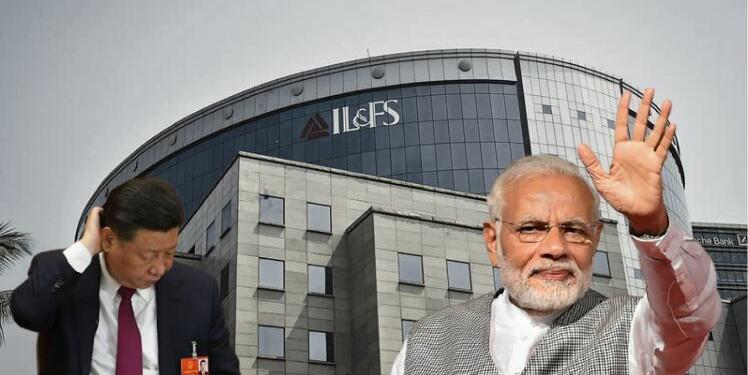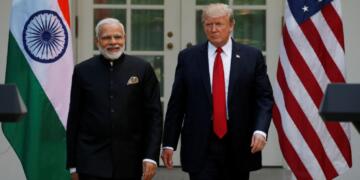China’s real estate giant Evergrande is heading towards its eventual doom amid dipping fortunes which could ultimately affect everything from the jobs market to property prices in the country. The longer the Xi Jinping regime continues to be a fence sitter, unwilling to take the decisive step to restructure the company or solve its debt problem, the quicker it will turn into China’s Lehman Brothers moment. However, the current situation in China also presents an opportunity to read two different approaches between two vastly different working governments.
Modi government clearing the IL&FS mess
The Indian government with the help of RBI in 2018 managed to stave off a particularly massive financial problem, through a series of carefully crafted measures. Reported by TFI, Infrastructure Leasing and Financial Services Ltd (IL&FS) — a non-banking financial company (NBFC), or ‘shadow bank’ went down under its own gargantuan debt weight.
Succinctly put, with a consolidated debt of around Rs 94,000 crores, the company was simply unable to find resources to pay its debt and found itself in an asset-liability mismatch. More than 60 per cent of the debt owed by the company was in the road building, power and water work projects.
India’s Lehman moment – an eventuality avoided
Much like Evergrande, IL&FS at the time threatened to be India’s Lehman moment, capable of triggering a collapse in the economy. However, the Modi government with its all ‘hands on the deck’ approach, quickly accessed the gravity of the crisis and jumped in with its resources.
Evergrande seems like China’s Lehman moment. Reminds us of IL&FS. Indian Government acted swiftly. Provided calm to financial markets. The Government appointed board estimates 61% recovery at IL&FS. Evergrande bonds in China trading ~ 25 cents to a $.
— Uday Kotak (@udaykotak) September 21, 2021
Uday Kotak was appointed by the government as the head of the lender’s board which also included Tech Mahindra Vice-Chairman, Managing Director and CEO Vineet Nayyar, former Sebi chief G N Bajpai, former ICICI Bank chairman G C Chaturvedi, former IAS officers Malini Shankar and Nand Kishore in 2018 to help the troubled company wade through the rough waters.
Fast forward today, a 61 per cent recovery of outstanding debt has been observed at IL&FS and Kotak has been granted a term extension as the non-executive chairman of the company for another six months.
Read More: How a government panel led by Uday Kotak solved the IL&FS Debt Crisis
NPAs – the legacy of the UPA regime
Similarly, to solve the burgeoning problem of NPAs (Non-Performing Assets) – a legacy generously passed on by the previous UPA regimes, the Modi government, in close consultations with the RBI, brought the Insolvency and Bankruptcy Code, 2016. The measure was a huge success in solving corporate insolvency in India.
The promoters who were exploiting the loopholes of the legal system and did not pay back deliberately, started running after creditors to pay back to ensure that they do not lose control of the company.
Reportedly, last month, thanks to IBC, the lenders of Dewan Housing Finance Corporation Ltd (DHFL), announced that it was about to receive the first installment of their dues. The total amount recovered in the first phase will be Rs 37, 400.
Read More: ₹37,400 crore: IBC marks the biggest recovery of NPAs this year
Reducing NPAs
Before the Modi government came to the power in 2014, the total NPAs stood around 52 lakh crore. The simplified process under the IBC has reduced NPAs to 8.34 lakh crores by March to 31 NPAs this year. Insolvency proceedings normally used to take around 4.3 years on an average in India, which is way slower than 1 year in the United Kingdom and 1.5 years in the USA. The IBC has not just reduced this time period, but also made India a friendlier destination for companies looking to invest in the country.
Read More: How the Insolvency and Bankruptcy Code has helped India reduce its Non Performing Assets
The main reason for NPA accumulation is nonpayment by the banks’ clients. In simpler terms, it is like a shopkeeper giving a customer some goods on credit, and the customer is not able to pay back to the shopkeeper. Most of the nonperforming assets in India are loans by government banks, because the management of these banks gives loan to companies without checking the viability of the project or the ability of the client to pay back.
Privatizing PSBs
With the public banks, putting huge pressure on the exchequer the government is even planning to privatize a few of them — starting with IDBI bank. Recently, RBI announced that it will be creating a new security clearance framework for screening potential bidders of PSBs. The process would be different from the privatization of any other PSU as more restrictions and measures will be embedded in the process.
Read More: To stop public sector banks from becoming a liability, the government comes up with a solution
Sure there is still a vast room for improvement as the IBC Courts are oversaturated by the case log with vacancies lying unfilled — the government has still done a commendable job. And if compared to China, it almost appears
How big is the Evergrande mess?
Chinese stock markets seem to agree with the larger risks attached to Evergrande Group’s default. They fear a contagion effect from Evergrande’s debt default hitting the property and banking sectors. This contagion effect has escalated the risks associated with investments inequities.
Regulators have warned that it is $305 billion of liabilities could spark broader risks to China’s financial system if its debts are not stabilised. Evergrande is purely a market failure and its market resolution lies in the hands of the Chinese government, which has been incredibly late in jumping onto the situation.
Read More: Evergrande topples, crushes China’s markets under its weight
The Chinese government did try to cool the real estate bubble by curbing excess leverage and denying the liberty enjoyed by China’s real estate giants in the property sector to refinance debt.
However, this is exposing the issues of tight liquidity and cash crunch in the case of companies like Evergrande and Fantasia. The Chinese real estate giants are getting overstretched. Compare the current situation in China with India and you’ll find that instead of shrugging its hands off the companies, the Modi government attempts to fix things.























